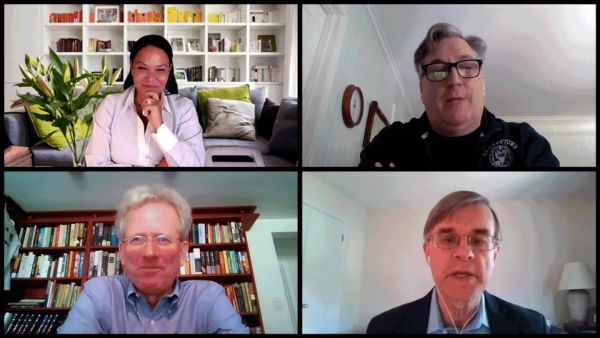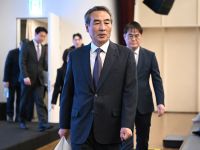Annual Crisis Simulation At QF Partner Georgetown Tackles Crisis In Libya

At QF partner Georgetown University in Qatar (GU-Q), 35 students took part in the annual Crisis Simulation diplomacy exercise, which allows participants to practice the intensive, multi-party negotiations required to reach an international agreement on how to resolve current issues facing the world today. This year’s scenario is a UN-led peace talk aimed at solving the ongoing conflict in Libya that has cost lives and created national and regional instability.
Negotiation simulations prompt students to engage in collaborative problem solving and teach valuable negotiation skills, said Dr. Christine Schiwietz, GU-Q Assistant Dean for Academic Affairs and the program organizer. “The simulation has students step into the shoes of key players facing a real diplomatic challenge, an unparalleled hands-on experiential learning activity. Students learn how to build coalitions in a multilateral context and learn the critical role mediators can play in global policy negotiations.”
The exercise is co-organized by James Seevers, Director of Studies at the Institute for the Study of Diplomacy (ISD) at Georgetown University in Washington, DC. Reflecting on this year’s first-ever virtual simulation with GU-Q, he said: “With a few modifications, we successfully adapted ISD’s negotiation simulations online. This change ensured a continuation of Georgetown’s diplomatic training activities, and is a reflection of the new demands facing diplomats in a pandemic, with global leaders also conducting some of their critical diplomatic work online.”
Set in the year 2022, this year’s scenario involved a United Nations Support Mission in Libya (UNSMIL) hosting another peace conference in an attempt to secure a long-term deal between the two main rival parties. Student teams representing the United States, Russia, Turkey, the United Arab Emirates, and the European Union also took on roles in the talks.
Students were given detailed information about the situation and their roles, and advisors with significant professional diplomatic experience provided expert guidance on how to determine national interests and negotiate for best possible outcomes.
For International Politics major Alak Raad (GU-Q'23), the experience drove home the complexity of compromise. "I learned that coming up with solutions through diplomacy is something that takes time. The voices involved seek to integrate their self-interested goals in this process, thereby neglecting the bigger picture of saving lives.”
The former U.S. Ambassador to Tunisia Gordon Gray took on the role of the UN Special Representative. Expert advisors also included former U.S. Ambassador to the People’s Democratic Republic of Algeria John Desrocher, and the Director of the Brookings Doha Center Dr.Tarik Yousef.
ISD State Department Rusk Fellow Hammad Hammad, ISD Case Studies and Publications Editor Alistair Somerville, and ISD Research Assistant Jonas Heering created the simulation materials and coordinated the exercise.
Mr. Somerville said “This was a fantastic way to test out ISD's new simulation materials on Libya with an engaged and enthusiastic group of students. They tackled the negotiation with a great deal of flexibility and creativity. We now look forward to preparing the materials for publication in our online case studies library so that instructors around the world can also run this exercise with their students.”
The final module on the last day of the simulation saw student participants and organizers gather to discuss the outcome of the negotiations and to share lessons learned.
Background Information
Georgetown University in Qatar
Established in 1789 in Washington, DC, Georgetown University is one of the world’s leading academic and research institutions. Georgetown University in Qatar (GU-Q), founded in 2005 in partnership with Qatar Foundation, seeks to build upon the world-class reputation of the university through education, research, and service. Inspired by the university’s mission of promoting intellectual, ethical, and spiritual understanding, GU-Q aims to advance knowledge and provide students and the community with a holistic educational experience that produces global citizens committed to the service of humankind.
Located in Doha’s Education City, GU-Q offers the same internationally recognized Bachelor of Science in Foreign Service degree as Georgetown’s Capitol Campus in Washington, DC. This unique, interdisciplinary program prepares students to tackle the most important and pressing global issues by helping them develop critical thinking, analytic, and communication skills within an international context. GU-Q alumni work in leading local and international organizations across industries ranging from finance to energy, education, and media. The Qatar campus also serves as a residency and delivery location for the Executive Master’s in Emergency and Disaster Management along with the Executive Master’s in Leadership.







